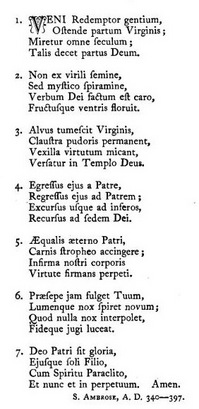The Hymn at Matins: Singing in the Night

Stretching Godward
My own experience is that the Invitatory, with the repetition of its pressing call to adoration, establishes the soul in the realm of “spirit and truth” that is the ground of all prayer. Before entering the quiet vastness of the psalmody, there is the hymn. The rhythm of its poetry, and sometimes its melody, is a kind of “stretching exercise” before settling down for the First Nocturn.

Beginning on December 17th, the hymn at Matins is Veni, Redemptor Gentium, attributed to Saint Ambrose.
Redeemer of the nations, come!
Appear, Thou Son of Virgin womb!
Astonished be the realms of earth,
for Godlike is His wondrous birth.
The first strophe is a plea for the redemption of all nations and for the fulfilment of the prophecy of Isaias: “Behold a virgin shall conceive, and bear a son, and his name shall be called Emmanuel” (Is 7:14).
He, of no mortal man conceived,
By mystic influence received,
The Word of God, our flesh is made,
O’er woman’s fruit is honour shed.
Saint Ambrose says that the Incarnation of the Word took place “mystico spiramine,” that is, by means of a secret inbreathing.
The Virgin’s breast an offspring hides,
Unharmed yet modesty abides;
There Virtue’s banners shine abroad,
Within His Temple walks our God!
In the Latin text Saint Ambrose realistically evokes the swelling of the Virgin’s belly: “Alvus tumescit Virginis.” Then he uses the charming expression, “Claustrum pudoris permanet” — but remains the cloister of purity. He goes on to describe what is happening within the Virgin’s womb: the banners of virtue shine forth and God is rocked (versatur) in His Temple. The womb of the Virgin is the Temple of God, and His Temple has become a cradle!
Proceeding from His chamber He,
That royal court of chastity,
Of two-fold substance, Giant Son,
Prepares His mighty course to run.
Forth from the Father He proceeds,
Again unto the Father speeds:
His goings e’en to Hell extend,
And at God’s Throne returning end.
The imagery in these two strophes is drawn from Psalm 18:6-7. This psalm will be sung at Vigils of Christmas; it also occurs at Vigils in the Common of the Blessed Virgin Mary.
He hath set his tabernacle in the sun: and he, as a bridegroom coming out of his bride chamber, Hath rejoiced as a giant to run the way: His going out is from the end of heaven, And his circuit even to the end thereof: and there is no one that can hide himself from his heat.
Here one sings the whole economy of salvation: the exitus a Deo and the reditus ad Deum, the Incarnation and the Paschal Mystery of death, descent into hell, resurrection, and ascension.
To Thy Great Father, Equal Son,
O gird Thy carnal vesture on!
The frailties of mortal flesh
With thy unfailing strength refresh.
Carnis tropaeo accingere: The verb accingere links this strophe to another psalm that will be sung at Vigils of Christmas and at Vigils in the Common of the Blessed Virgin Mary, Psalm 44. Whereas the psalm has the Bridegroom-Warrior-King girding his sword upon his thigh, the hymn has Christ, the true Bridegroom-Warrior-King girding on the flesh of our humanity to reinvigorate it by the virtus — might — of His Divinity.
Thy manger, lo! effulgent beams,
Night with unwonted lustre teems,
Which never more shall darkness know,
But shine with Faith’s immortal glow.
One hears behind this strophe the language of Psalm 138:12, also woven into the Exultet of the Paschal Vigil: “But darkness shall not be dark to thee, and night shall be light as day: the darkness thereof, and the light thereof are alike to thee.” The night of Christ’s birth, like that of His resurrection, glows with a divine and heavenly light. This imagery is, of course, related to the parallelism evoked by the “virgin tomb” and “virgin womb.”
Glory to God, the Father, be!
And Only Son, alike to Thee,
And to the Spirit Paraclete,
Now and for ever as is meet. Amen.
The doxology of the hymn already indicates that it is time to settle down for the psalmody of the First Nocturn. In comparison to the lyrical quality and melody of the hymn, the psalmody is almost murmured. This is the contemplative heart of the Divine Office. Dom Odo Casel, O.S.B. says:
When the hymn is over, the mind is sufficiently awake and prepared. Now we come to the real purpose of night worship, contemplation. Vast, mysterious, difficult psalms pass before the soul’s eye; the mysteries of God make themselves known in hard phrases. The soul wrestles with God for salvation, for knowledge of Him. (The Mystery of Christian Worship).

Father Mark,
Your comments on the beautiful Office hymns for these last days of Advent are truly a wonderful gift! I am filled with gratitude for these and all your postings throughout the year. May you and your fledgling monastery be richly blessed as we prepare to celebrate the birth in time of the Eternal Word. Oremus pro invicem,
Bailey Walker
Falls Church, Virginia